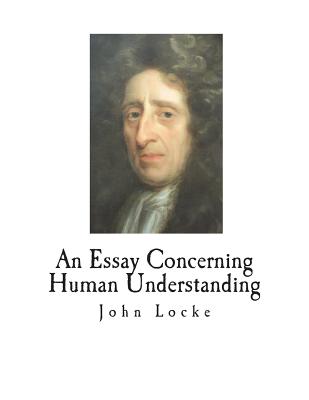
Chapter I No Innate Speculative Principles
John Locke’s “An Essay Concerning Human Understanding” stands as one of the essential books for philosophers and non- philosophers alike show more content He concludes that there are no innate ideas and instead proposes the well-known theory that the mind is a blank slate. Locke continues that man gains all the knowledge he has from experience 7. Occasion of this essay. This was that which gave the first rise to this Essay concerning the understanding. For I thought that the first step towards satisfying several inquiries the mind of man was very apt to run into, was, to take a survey of our own understandings, examine our own powers, and see to what things they were adapted An Essay Concerning Human Understanding by John Locke is one of the great books of the Western world. It has done much to shape the course of intellectual development, especially in Europe and America, ever since it was first published in
2. The Limits of Human Understanding
7. Occasion of this essay. This was that which gave the first rise to this Essay concerning the understanding. For I thought that the first step towards satisfying several inquiries the mind of man was very apt to run into, was, to take a survey of our own understandings, examine our own powers, and see to what things they were adapted John Locke's classic work An Essay Concerning Human Understanding laid the foundation of British empiricism and remains of enduring interest today. Rejecting doctrines of innate principles and ideas, Locke shows how all our ideas, even the most abstract and complex, are grounded in human experience--attained by sensation of external things or reflection upon our mental The Essay concerning Human Understanding, first published in , is by far the most important of Locke's philosophical works. Four editions appeared during his lifetime and a fifth shortly after his death; all the later editions introduce significant changes, and both the second () and the fourth () contain wholly new blogger.com: J. R. Milton
1. Historical Background and Locke’s Life
7. Occasion of this essay. This was that which gave the first rise to this Essay concerning the understanding. For I thought that the first step towards satisfying several inquiries the mind of man was very apt to run into, was, to take a survey of our own understandings, examine our own powers, and see to what things they were adapted John Locke's classic work An Essay Concerning Human Understanding laid the foundation of British empiricism and remains of enduring interest today. Rejecting doctrines of innate principles and ideas, Locke shows how all our ideas, even the most abstract and complex, are grounded in human experience--attained by sensation of external things or reflection upon our mental The Essay concerning Human Understanding, first published in , is by far the most important of Locke's philosophical works. Four editions appeared during his lifetime and a fifth shortly after his death; all the later editions introduce significant changes, and both the second () and the fourth () contain wholly new blogger.com: J. R. Milton

INTRODUCTION
John Locke’s “An Essay Concerning Human Understanding” stands as one of the essential books for philosophers and non- philosophers alike show more content He concludes that there are no innate ideas and instead proposes the well-known theory that the mind is a blank slate. Locke continues that man gains all the knowledge he has from experience 7. Occasion of this essay. This was that which gave the first rise to this Essay concerning the understanding. For I thought that the first step towards satisfying several inquiries the mind of man was very apt to run into, was, to take a survey of our own understandings, examine our own powers, and see to what things they were adapted John Locke's classic work An Essay Concerning Human Understanding laid the foundation of British empiricism and remains of enduring interest today. Rejecting doctrines of innate principles and ideas, Locke shows how all our ideas, even the most abstract and complex, are grounded in human experience--attained by sensation of external things or reflection upon our mental
Navigation menu
The Essay concerning Human Understanding, first published in , is by far the most important of Locke's philosophical works. Four editions appeared during his lifetime and a fifth shortly after his death; all the later editions introduce significant changes, and both the second () and the fourth () contain wholly new blogger.com: J. R. Milton John Locke’s “An Essay Concerning Human Understanding” stands as one of the essential books for philosophers and non- philosophers alike show more content He concludes that there are no innate ideas and instead proposes the well-known theory that the mind is a blank slate. Locke continues that man gains all the knowledge he has from experience An Essay Concerning Human Understanding by John Locke is one of the great books of the Western world. It has done much to shape the course of intellectual development, especially in Europe and America, ever since it was first published in
No comments:
Post a Comment